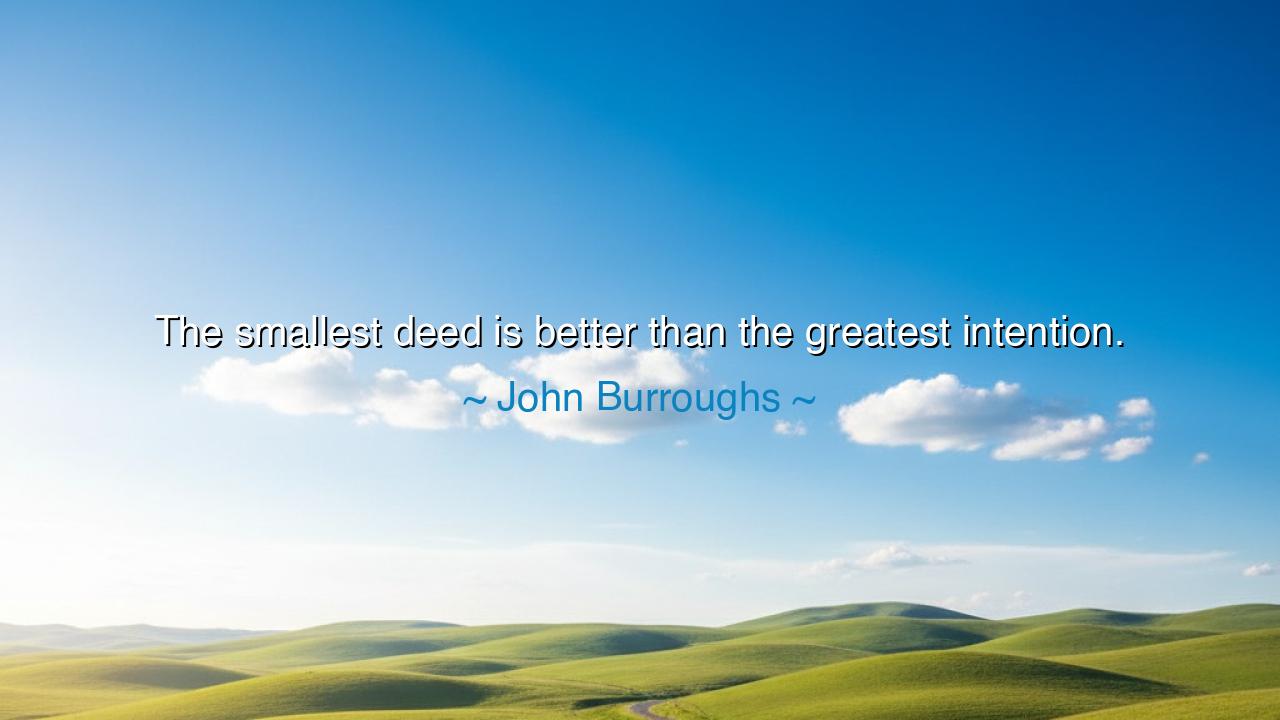
The smallest deed is better than the greatest intention.






Hearken, children of the ages, and ponder the words of John Burroughs: “The smallest deed is better than the greatest intention.” In these words lies the eternal truth of action over idle thought, of the subtle yet profound power of even the humblest effort. Great intentions, though noble, remain but shadows if unaccompanied by effort and execution. It is through deeds, however modest, that the world is shaped, lives are touched, and virtue is made manifest.
The origin of this wisdom springs from Burroughs’ life as a naturalist and essayist in 19th-century America, a man who observed the intricate workings of nature and the small acts that sustain life. He understood that the grandeur of thought or aspiration is fleeting if not translated into practical action. In his writings, he celebrated the ordinary gestures, the quiet labors, and the daily deeds that give life meaning and effect change.
Consider the story of Florence Nightingale, who, though driven by a vision of reform and care, began her mission with small acts: tending to the wounded, organizing supplies, and comforting the sick. These seemingly minor deeds, executed faithfully and persistently, transformed military medicine and public health forever. Nightingale exemplifies Burroughs’ truth: even the smallest action, carried with resolve, outweighs the loftiest intention unacted upon.
In daily life, this teaching resonates with all who seek to leave a mark. A kind word, a helping hand, a gesture of generosity—these modest acts ripple outward, producing effects greater than unfulfilled plans or unrealized ambitions. Burroughs reminds us that the value of life is measured not by what we dream, but by what we do, and even the tiniest action is a seed of lasting consequence.
History provides countless echoes of this truth. Consider Mahatma Gandhi, whose vision of nonviolent resistance could have remained a mere idea. Yet it was through small acts—marches, fasting, and steadfast civil disobedience—that the dream of freedom became real. The grandeur of intention alone would have accomplished nothing; it was the persistent deeds, however small, that wrought monumental change.
Therefore, children of future generations, take this teaching to heart: let not your noble intentions remain idle, for the smallest deed, executed with courage and sincerity, carries power beyond imagination. Act, even in humility, and you will see that the world is shaped not by dreams alone, but by the tireless hands and hearts that transform thought into reality. In action lies the true measure of virtue and legacy.






TAThu Anh
Quick gut-check as a manager: how would you translate this principle into team rituals without encouraging reckless shipping? What might weekly practice look like—demo hours, “one small push” Fridays, batched micro-PRs, or timeboxed discovery sprints? Which metrics keep us honest—customer impact, cycle time, rework rates, incident counts? And how do we defend quiet, strategic planning that looks inactive but seeds future breakthroughs? I’m aiming for a culture that rewards movement and learning, yet refuses to confuse speed with value.
ATNguyen Ngoc Anh Thu
I’m curious about the psychology underneath this maxim. Does taking a tiny step reshape identity faster than rehearsing plans in our heads? If so, what mechanisms do you see—dopamine, habit loops, exposure therapy, social proof? Can one keystone behavior (say, sending a single outreach email) alter self-concept enough to change trajectories? Conversely, are there moments when not acting preserves optionality and yields better long-term results? I’d love an evidence-informed take: experiments, case studies, or metrics that separate productive micro-actions from noise.
QHVo quoc hoang
This perspective sounds energizing, but I worry about unequal risk. Some people can move first without penalty; others face outsized consequences for the same behavior. In civic life and at work, who is granted grace for messy first steps, and who gets punished? Could emphasizing action inadvertently sideline those who must secure consensus or safety before proceeding? How would you adapt this mindset for people in precarious roles, or for movements where slow deliberation prevents harm? I’m seeking an equity-aware lens that honors courage while acknowledging structural constraints.
BKBang Khanh
Whenever I hear this saying, I think about perfectionism. I tend to overpolish proposals and roadmaps until momentum dies. Practically speaking, what frameworks convert aspiration into safe, fast execution? Would you advocate a two-minute rule, daily minimums, or micro-commitments that compound? On the flip side, how do we avoid celebrating hasty, uncoordinated tasks that create rework for others? I’d value a pragmatic set of guardrails—signals that a small step is truly valuable, not just motion: e.g., customer evidence, reversible decisions, or a clearly defined next step.
TTnguyen the trung
Reading this line, I’m torn about how it treats outcomes versus motives. Suppose someone donates a tiny amount to a cause while harboring self-serving motives—does the modest action still outrank a sincere, thoughtful plan that never launches? Ethically, do we judge by consequences or by character growth? I’d love your perspective on where intention meaningfully matters: in courts, in relationships, in leadership reviews. Also, how should we assess actions that are symbolic but catalytic, like a first shaky commit to a codebase that unblocks a team? Is there a threshold where tiny gestures become mere performance?